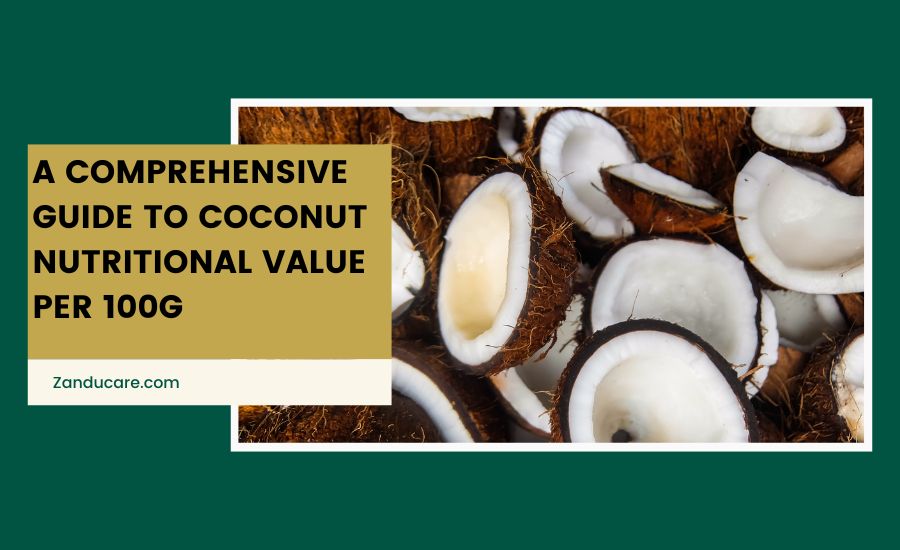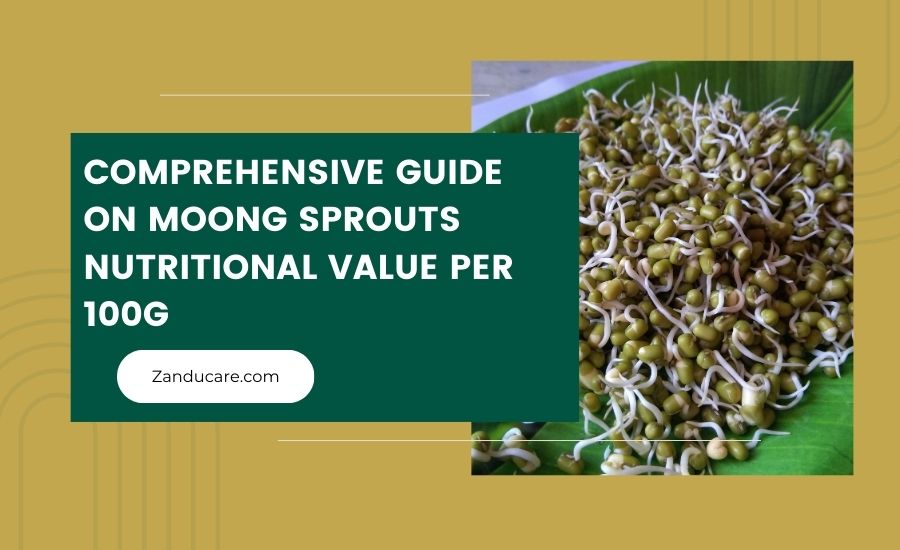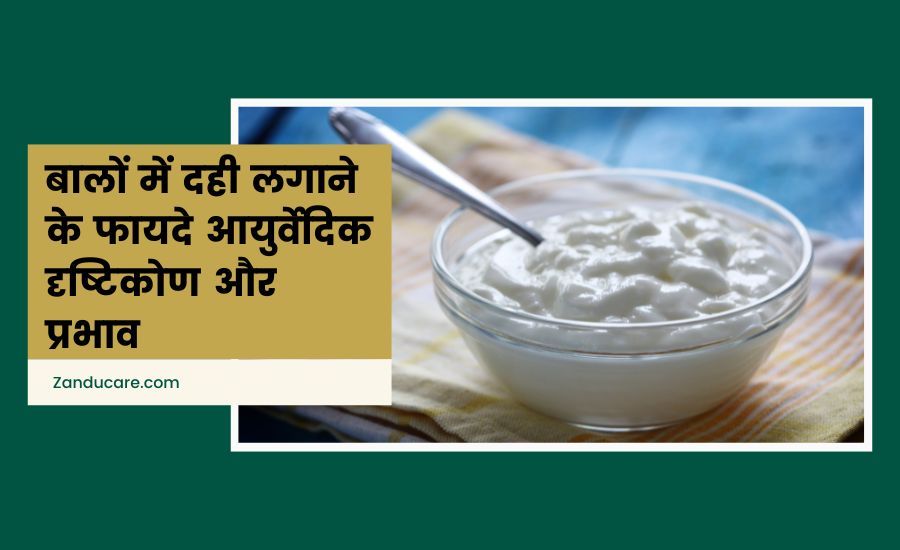
Coconut Nutrients Value Per 100g: Uses & Benefits
Beyond their culinary appeal, coconuts are a versatile fruit with a rich cultural heritage. Highly valued for its delicious and revitalising juice, coconut also plays a vital part in conventional Ayurvedic treatment.
This article explores the coconut nutritional value per 100g in detail. We will shed light on how the traditional Indian medical system Ayurveda views this unique fruit and offer helpful tips for integrating coconut into your daily routine for health.
|
Did You Know?
|
Nutritional value of coconut per 100g

There are three tasty varieties of coconut — fresh coconut, dried coconut, and coconut water. Each has a different nutritional composition:
- Fresh coconut: This white, meaty inside contains nutrients such as iron and manganese, dietary fibre, and medium-chain triglycerides (fats).
- Dried coconut: Packed full of fibre and vitality, dried coconut also has a good amount of iron and manganese.
- Coconut water: It is a cool drink rich in electrolytes like potassium and magnesium yet low in calories and fat.
In the next section, uncover the nutritional breakdown of fresh coconut, including details on its macronutrients, vitamins, and more. Also, the following section will provide a comparison table outlining the nutritional distinctions between dried coconut, fresh coconut, and coconut water.
Macronutrients in coconut
There are three main macronutrients present in coconut. This includes carbohydrates, fats, and proteins. Let’s learn more about these macronutrients in coconut in detail:
Carbohydrates
Although fresh coconut is well-known for its beneficial lipids, it still contains a modest quantity of carbs. It's a low-carb option because a normal serving (100g) has about 15.23g of total carbohydrates. However, the fibre content is the real star.
There are around 7g of this healthy ingredient in every meal. Fibre slows down the digestive process, which increases feelings of fullness and may help regulate blood sugar. Fresh coconut is a great option for anyone looking to maintain a balanced diet because of its high fibre content and low carbohydrate content.
Proteins
Fresh coconut provides a reasonable quantity of protein, about 3.33g per 100g. Coconut protein well-balances some necessary amino acids, such as arginine and lysine, which are crucial for maintaining and growing muscle tissue.
However, coconut lacks certain other necessary amino acids, which makes it less suitable as a complete protein source. When combined with other protein-rich foods, like nuts or legumes, coconut can help create a well-rounded diet.
Fresh coconut offers a reasonable amount of protein with a particular amino acid profile. When paired with other protein-rich foods, even if it isn't a complete protein source, it can be a useful supplement to a balanced diet.
Fats
There are about 33.49g of beneficial fats in 100g of fresh coconut. Interestingly, more than 80% of this fat is saturated fat. However, unlike animal-derived saturated fats, the main component of coconut fat is medium-chain triglycerides (MCTs).
Given the way the body metabolises MCTs, there may be health benefits. Research indicates that MCTs may not have the same detrimental effect and may even enhance HDL ("good") cholesterol, even though some saturated fats can elevate LDL ("bad") cholesterol.
Furthermore, the body can easily use MCTs as fuel for weight control. Remember that moderation is essential and that fresh coconut still has a substantial fat content. But coconut oil's special kind of fat gives it a clear advantage over a lot of other types of saturated fat.
Vitamins and minerals in coconut
Vitamins
Fresh coconut provides numerous important vitamins. Here’s a breakdown:
- Vitamin C: A tiny quantity of vitamin C found in fresh coconuts supports collagen synthesis and immune system performance.
- Vitamin B: B1 (thiamine), B3 (niacin), B5 (pantothenic acid), and B6 (pyridoxine) are all present in trace amounts in coconut. The metabolism of energy, cognitive function, and cell health are all impacted by these B vitamins.
- Other vitamins: Vitamin E, an antioxidant crucial for cell defence, may be present in tiny amounts in fresh coconuts, but other vitamins are scarce in this type of coconut.
While coconut contains certain vitamins, remember that fruits and vegetables, which are generally higher in vitamins and minerals, are the ideal foods to eat in a balanced diet.
Minerals
Fresh coconuts are rich in minerals that are essential for daily health. Among them are:
- Macrominerals: Potassium, magnesium, and phosphorus are necessary to keep muscle tone, bone health, and an appropriate electrolyte balance.
- Trace minerals: Although found in lesser quantities, iron, zinc, and copper are essential for synthesising red blood cells, immunity, and enzyme activity.
Incorporating fresh coconut into your diet helps ensure that you get these nutrients in a balanced way. While magnesium promotes energy creation and the neurological system's health, potassium aids in blood pressure regulation.
Phosphorus is essential for cellular functions and bone health. Trace minerals like copper help construct connective tissue and provide energy, zinc aids in wound healing and immune system function, and iron is essential for the transportation of oxygen.
Coconut and Ayurveda
Ayurvedic classification of coconut:
According to Ayurveda, coconut is a diverse fruit with a balancing impact. Pitta dosha, which controls metabolism, is calmed by its sweet flavour and refreshing quality.
Coconut water is recognised for its ability to soothe Pitta and replenish moisture, especially from young coconuts. However, it is best ingested in moderation for Kapha balance because of its slightly hefty characteristics.
Ayurvedic view on coconut health benefits:
Ayurveda regards coconut as a fruit that is both flexible and beneficial. The cooling qualities of tender coconut water balance Pitta dosha, improving digestion and lowering acidity.
The beneficial fats found in coconut flesh nourish and give the body more energy. The hydrating qualities of coconut oil are beneficial to skin health topically.
Ayurvedic recipes using coconut:

Coconuts are versatile and used in Ayurvedic cuisine for exterior and internal well-being. To balance Pitta dosha, fresh coconut milk is used as the base for comforting curries and kitchari. Pulling coconut oil in the morning helps with dental hygiene.
A simple chutney made with ginger, cilantro, and coconut can help digestion. These are only a few instances. So, to fully utilise coconut, incorporate it into your Ayurvedic regimen.
Comparison table: Coconut nutritional value per 100g
Here is a table representing coconut nutritional value per 100g for different types of coconuts out there:
|
Nutrient |
Fresh Coconut (100g) |
Dried Coconut (100g) |
Coconut Water (100ml) |
|
Calories |
354 kcal |
660 kcal |
19 kcal |
|
Carbohydrates |
15.23 g |
23.65 g |
3.71 g |
|
Proteins |
3.33 g |
6.88 g |
0.72 g |
|
Fats |
33.49 g |
64.53 g |
0.20 g |
|
Vitamin C |
3.3 mg |
1.5 mg |
2.4 mg |
|
Potassium |
356 mg |
543 mg |
250 mg |
|
Magnesium |
32 mg |
90 mg |
25 mg |
|
Iron |
2.43 mg |
3.36 mg |
0.29 mg |
Health benefits of coconut
In this section, learn the benefits of coconut for your heart, immunity, skin, hair, and digestive system. So, keep reading.
For heart health
Although studies are still being conducted, some indicate that coconut may have heart health benefits. Medium-chain triglycerides (MCTs), a kind of fat found in coconuts, may be simpler for the body to use and burn for energy.
MCTs may have a distinct metabolism, which may also help reduce LDL ("bad") cholesterol levels. However, since coconut oil also contains a lot of saturated fat, moderation is essential.
For digestive health
The substantial amount of dietary fibre in coconut flesh helps to maintain regularity and digestive health by giving faeces more volume.
Furthermore, prebiotics included in coconuts support healthy intestinal health by supplying good bacteria. These good bacteria facilitate digestion, ultimately aiding in lessening inflammation and improving gut health in general.
For immune system
Because of their immune-boosting nutrients and antibacterial qualities, coconuts may help maintain a healthy immune system. Coconut flesh and oil contain lauric acid, which may have antiviral and antibacterial properties.
Furthermore, coconut provides MCTs, an important nutrient that may enhance immune cell function and manganese. A complementary strategy for immunological health may involve including coconut in your diet. However, further research is required.
For skin and hair

A natural remedy for good skin and hair can be found in coconut. Its abundant fatty acids provide intense hydration and nourishment, fostering robust hair and a glowing complexion.
Moreover, coconut oil is appreciated for its ability to permeate the hair shaft, promoting growth and mitigating dryness. Its antibacterial qualities might also support the upkeep of scalp health.
Also, do check:
Potential drawbacks and considerations
Coconut has a hint of the tropics without being overly caloric. Pay attention to portion proportions so that they support your weight loss objectives.
Furthermore, coconut may cause allergic responses in certain people. Speak with a healthcare provider if you have any concerns. Remember that moderation is essential. Enjoy coconut as a balanced diet because it has so many potential health benefits.
Conclusion
To sum up, coconut provides a special combination of essential minerals, healthy fats, and a high-quality source of dietary fibre. Coconut can add important nutrients to a balanced diet, but be aware of its high saturated fat level.
Ayurveda is in line with this strategy because of its focus on entire foods. By merging this age-old knowledge with contemporary nutritional science, we may make well-informed decisions to improve our health. So, try adding coconut to your diet and enjoy all its benefits from today!
FAQs
1. What are the nutritional benefits of eating coconut?
Coconut has numerous nutritional advantages. It's an excellent source of heart-healthy fats, especially medium-chain triglycerides (MCTs), which may boost heart health and metabolism. In addition, coconut contains dietary fibre that promotes intestinal health and important minerals, including manganese, copper, and iron.
2. How much coconut should I eat per day?
Up to 40g of raw coconut is acceptable daily. Grate it, extract the milk, and boil it, and it becomes more cholesterol-laden.
3. Is coconut good for weight loss?
Coconut flesh might help you lose weight. Research indicates that this fruit's MCTs may aid in weight loss by enhancing sensations of fullness, burning calories, and burning fat.
4. Can coconut water replace electrolytes after exercise?
Coconut water has high concentrations of electrolytes, including potassium and magnesium, just like Gatorade and other well-known sports drinks. So, you can use it after exercise as a post-workout energy drink.
5. What are the Ayurvedic benefits of coconut?
While coconut flesh and oil are sought after for nourishing and fostering good skin and hair, tender coconut water is particularly praised for its rehydrating and purifying properties. Coconut can be a beneficial supplement to an Ayurvedic diet.
6. Is coconut safe for people with nut allergies?
Although allergic reactions to coconut are possible, most persons with tree nut allergies can safely consume coconut. According to the ACAAI, coconuts are classified as fruits because they are not regarded as "botanical nuts."
7. How does coconut oil benefit hair and skin?
A special blend of fatty acids and antioxidants in coconut oil helps shield skin and hair from harm. Its antibacterial and antifungal qualities also help prevent various skin and hair problems.
8. Are there any side effects of consuming too much coconut?
Consuming too much coconut can increase the fat content in your body and may also result in digestive issues like diarrhoea.
References:
- Highly valued for its delicious and revitalising juice, coconut also plays a vital part in conventional Ayurvedic treatment. [https://www.researchgate.net/]
- Fresh coconut is a great option for anyone looking to maintain a balanced diet because of its high fibre content and low carbohydrate content. [https://www.researchgate.net/]
- The substantial amount of dietary fibre in coconut flesh helps to maintain regularity and digestive health by giving faeces more volume. [https://pubs.acs.org/doi/]
- Coconut flesh and oil contain lauric acid, which may have antiviral and antibacterial properties. [https://www.sciencedirect.com/]





Leave a comment
This site is protected by hCaptcha and the hCaptcha Privacy Policy and Terms of Service apply.